七年级英语上册 Unit 2 Let's play sports知识点梳理(下)(新版)牛津版
七年级英语上册Unit2Let’splaysports重要知识点新版牛津版

Unit2 重要知识点1.do /play sports做运动have a sports meeting 举行运动会sports shoes 运动鞋2.go walking=go for a walkhave/take a walk去散步go out for a walk出去散步take sb for a walk带某人去散步take one’s dog for a walk=walk one’s dog遛狗3.go to spl on foot=walk to spl.步行去某地4.real adj.真实的,真的➡ really adv.的确,确实He ______(real) likes Jim,because Jim is a______(real)friend.形容词:be后名前,修饰名词副词:修饰形容词/动词5.walk to my bowl走向我的碗➡walk to spl 走向某地6.time 不可数名词:时间some time一段时间 sometime某时可数名词:次数( / 倍)some times 几次 sometimes偶尔,有时many times a/every day一天多次 one time➡once two times➡twice ≥3数词+times I brush my teeth twice a day.(画线提问)➡How often do you brush teeth?I brush my teeth two times a day.(画线提问)➡How many times do you brush teeth a day?7.What/How about (doing) sth? (做)某事怎么样/如何?8.My favourite football player.①favourite = like...best②football player足球运动员★swimme r游泳运动员9.a member of.... ...的一员 He is a member of the Football Club.= be in/on.... = He is in the Football Club.= join.... = He joins the Football Club.10.look strong ➡系动词+形容词系动词:be动词,感官动词5个(look,smell,sound,taste,feel),keep11.play football very well.足球踢得非常好。
牛津译林版七年级英语上册Unit2Let’s play sports! 知识点归纳
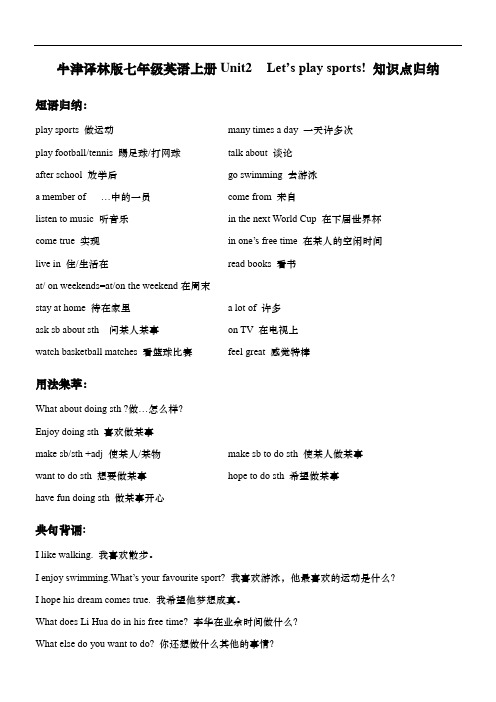
牛津译林版七年级英语上册Unit2 Let’s play sports!知识点归纳短语归纳:play sports 做运动many times a day 一天许多次play football/tennis 踢足球/打网球talk about 谈论after school 放学后go swimming 去游泳a member of …中的一员come from 来自listen to music 听音乐in the next World Cup 在下届世界杯come true 实现in one’s free time 在某人的空闲时间live in 住/生活在read books 看书at/ on weekends=at/on the weekend在周末stay at home 待在家里 a lot of 许多ask sb about sth 问某人某事on TV 在电视上watch basketball matches 看篮球比赛feel great 感觉特棒用法集萃:What about doing sth ?做…怎么样?Enjoy doing sth 喜欢做某事make sb/sth +adj 使某人/某物make sb to do sth 使某人做某事want to do sth 想要做某事hope to do sth 希望做某事have fun doing sth 做某事开心典句背诵:I like walking. 我喜欢散步。
I enjoy swimming.What’s your favourite sport? 我喜欢游泳,他最喜欢的运动是什么?I hope his dream comes true. 我希望他梦想成真。
What does Li Hua do in his free time? 李华在业余时间做什么?What else do you want to do? 你还想做什么其他的事情?Reading is fun. 读书是有趣的事情。
七年级上册英语Unit 2 Let's play sports Reading讲解-译林版
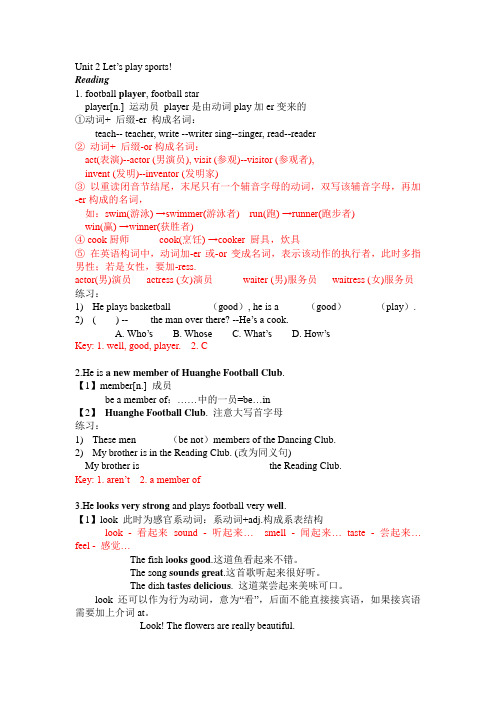
Unit 2 Let’s play sports!Reading1.football player, football starplayer[n.] 运动员player是由动词play加er变来的①动词+ 后缀-er 构成名词:teach-- teacher, write --writer sing--singer, read--reader②动词+ 后缀-or构成名词:act(表演)--actor (男演员), visit (参观)--visitor (参观者),invent (发明)--inventor (发明家)③以重读闭音节结尾,末尾只有一个辅音字母的动词,双写该辅音字母,再加-er构成的名词,如:swim(游泳) →swimmer(游泳者) run(跑) →runner(跑步者)win(赢) →winner(获胜者)④ cook厨师cook(烹饪) →cooker 厨具,炊具⑤在英语构词中,动词加-er或-or变成名词,表示该动作的执行者,此时多指男性;若是女性,要加-ress.actor(男)演员actress (女)演员waiter (男)服务员waitress (女)服务员练习:1)He plays basketball _______(good), he is a _____(good)______(play).2)( ) --____ the man over there? --He’s a cook.A. Who’sB. WhoseC. What’sD. How’sKey: 1. well, good, player. 2. C2.He is a new member of Huanghe Football Club.【1】member[n.] 成员be a member of:……中的一员=be…in【2】Huanghe Football Club. 注意大写首字母练习:1)These men ______(be not)members of the Dancing Club.2)My brother is in the Reading Club. (改为同义句)My brother is ________ ________ ________ the Reading Club.Key: 1. aren’t 2. a member of3.He looks very strong and plays football very well.【1】look 此时为感官系动词:系动词+adj.构成系表结构look - 看起来sound - 听起来…smell - 闻起来…taste - 尝起来…feel - 感觉…The fish l ooks good.这道鱼看起来不错。
牛津译林版七年级英语上册Unit 2 Lets play sports(综合运用+主题阅读,含答案)
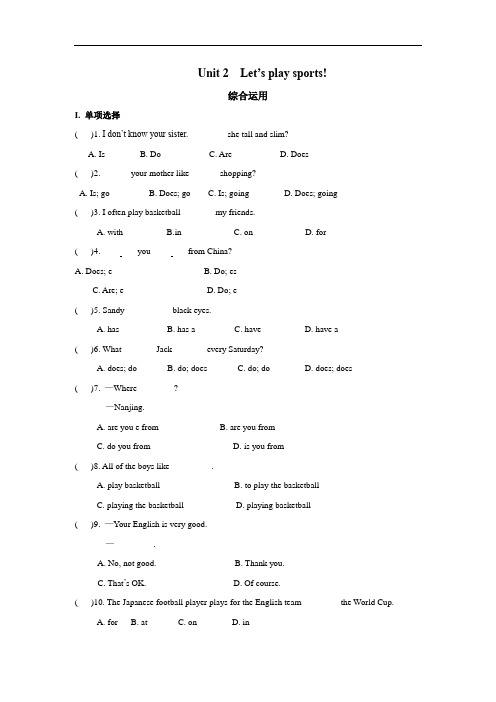
Unit 2 Let’s play sports!综合运用I. 单项选择( )1. I don’t know your sister. ________ she tall and slim?A. IsB. DoC. AreD. Does( )2. ______ your mother like ______ shopping?A. Is; goB. Does; goC. Is; goingD. Does; going( )3. I often play basketball _______ my friends.A. withB.inC. onD. for( )4. ____ ___ you ____ ___ from China?A. Does; eB. Do; esC. Are; eD. Do; e( )5. Sandy __________ black eyes.A. hasB. has aC. haveD. have a( )6. What _______ Jack _______ every Saturday?A. does; doB. do; doesC. do; doD. does; does( )7. —Where ________?—Nanjing.A. are you e fromB. are you fromC. do you fromD. is you from( )8. All of the boys like _________.A. play basketballB. to play the basketballC. playing the basketballD. playing basketball( )9. —Your English is very good.—________.A. No, not good.B. Thank you.C. That’s OK.D. Of course.( )10. The Japanese football player plays for the English team ________ the World Cup.A. forB. atC. onD. in( )11. The baby is only 5 ________ old, so he can’t speak now.A. monthB. monthsC. yearD. years ( )12. —________my master?—No, he isn’t.A. Are youB. Is heC. Is sheD. Is you ( )13. — ________ you ________ a ruler?—Yes, I ________.A. Do, have; doB. Does, have; doesC. Do, has; doesD. Does, has; do( )14. —Does she study Maths at school?—_________.A. Yes, she is.B. No, she isn’t.C. Yes, she does.D. No, she does.( )15. Jack _______ lunch at school. He _________ lunch at home.A. doesn’t have; hasB. doesn’t have; haveC. don’t have; hasD. don’t have; haveII. 句型转换1. Is he from Beijing? (改为同义句)_________________________________2. The boy’s English name is Johnson. (对划线部分提问)_________________________________3. Wendy’s mother is 45 years old. (对划线部分提问)_________________________________4. They are in the Reading Club this term. (改为一般疑问句)_________________________________5. My favourite sport is swimming. (对划线部分提问)_________________________________6. Do you often have breakfast at home? (用Kitty替换主语you改写句子) _________________________________7. Andy likes playing with his sister. (改为一般疑问句)_________________________________8. Simon often scores for his school football team. (改为一般疑问句) _________________________________9. They often go running in the park. (改为否定句)_________________________________10. Mary does well in singing English songs. (改为同义句)_________________________________III. 根据所给汉语完成句子1. 李华擅长踢足球。
七年级英语上册 Unit 2 Let’s play sports!Grammar课

第1篇一、前言时光荏苒,岁月如梭。
转眼间,一年一度的销售工作已经落下帷幕。
在过去的一年里,在公司领导的正确指导下,全体销售团队齐心协力,克服重重困难,取得了显著的成绩。
现将本年度销售工作进行全面总结,以期为下一年的销售工作提供借鉴和改进。
二、年度销售业绩概述1. 销售总额本年度,公司实现销售额XX亿元,同比增长XX%,创历史新高。
其中,国内市场销售额XX亿元,同比增长XX%;国际市场销售额XX亿元,同比增长XX%。
2. 产品销售情况本年度,公司主要产品A、B、C的销售额分别为XX亿元、XX亿元、XX亿元,分别同比增长XX%、XX%、XX%。
其中,A产品在国内外市场均取得了良好的销售业绩,成为公司销售额的主要来源。
3. 市场份额本年度,公司在国内外市场的市场份额分别达到XX%、XX%,较去年同期提高XX%、XX%。
其中,国内市场占有率位居行业前列,国际市场竞争力不断提升。
三、销售工作亮点及成功经验1. 市场拓展(1)加大市场调研力度,深入了解市场需求,为公司产品研发和市场定位提供有力支持。
(2)积极参加国内外各类展会,提升公司品牌知名度和影响力。
(3)加强与行业协会、合作伙伴的沟通与合作,拓宽销售渠道。
2. 产品创新(1)持续加大研发投入,推出多款具有竞争力的新产品,满足市场需求。
(2)优化产品结构,提高产品附加值,提升产品竞争力。
(3)加强产品售后服务,提高客户满意度。
3. 团队建设(1)加强销售团队培训,提高销售人员的业务能力和综合素质。
(2)建立健全激励机制,激发团队活力,提升团队凝聚力。
(3)优化团队结构,选拔优秀人才,为公司发展注入新鲜血液。
4. 客户关系管理(1)建立完善的客户信息管理系统,实现客户信息全面掌握。
(2)定期开展客户回访活动,了解客户需求,提高客户满意度。
(3)加强与客户的沟通与合作,建立长期稳定的合作关系。
四、存在的问题及改进措施1. 问题(1)市场竞争加剧,部分产品市场份额受到挤压。
七年级英语上册 Unit 2 Let's play sports知识点梳理(下)(新版)牛津版
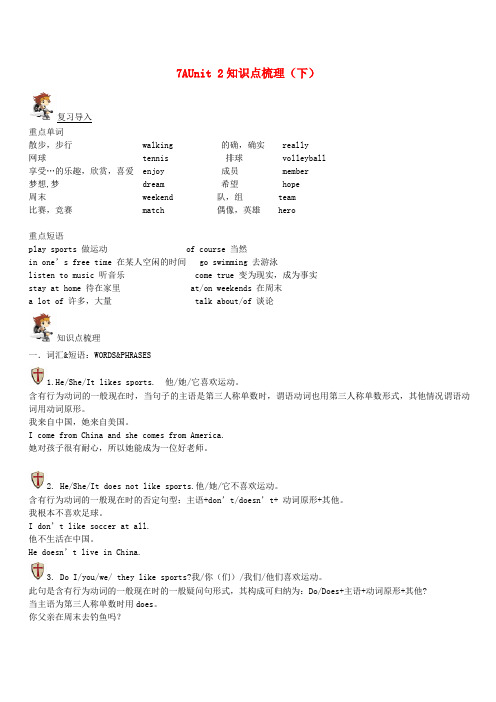
7AUnit 2知识点梳理(下)复习导入重点单词散步,步行 walking 的确,确实 really网球 tennis 排球 volleyball享受…的乐趣,欣赏,喜爱 enjoy 成员 member梦想,梦 dream 希望 hope周末 weekend 队,组 team比赛,竞赛 match 偶像,英雄 hero重点短语play sports 做运动 of course 当然in one’s free time 在某人空闲的时间 go swimming 去游泳listen to music 听音乐 come true 变为现实,成为事实stay at home 待在家里 at/on weekends 在周末a lot of 许多,大量 talk about/of 谈论知识点梳理一.词汇&短语:WORDS&PHRASES1.He/She/It likes sports. 他/她/它喜欢运动。
含有行为动词的一般现在时,当句子的主语是第三人称单数时,谓语动词也用第三人称单数形式,其他情况谓语动词用动词原形。
我来自中国,她来自美国。
I come from China and she comes from America.她对孩子很有耐心,所以她能成为一位好老师。
2. He/She/It does not like sports.他/她/它不喜欢运动。
含有行为动词的一般现在时的否定句型:主语+don’t/doesn’t+ 动词原形+其他。
我根本不喜欢足球。
I don’t like soccer at all.他不生活在中国。
He doesn’t live in China.3. Do I/you/we/ they like sports?我/你(们)/我们/他们喜欢运动。
此句是含有行为动词的一般现在时的一般疑问句形式,其构成可归纳为:Do/Does+主语+动词原形+其他?当主语为第三人称单数时用does。
牛津译林版七年级英语上册:Unit2Let'splaysports!
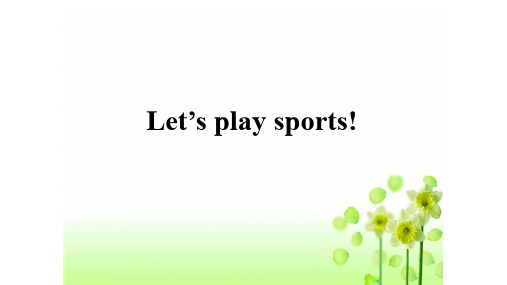
be动词的适当形式练习。
1. These watches __a_r_e_____ ours. 2. __Is_____ your teacher good to you? 3. There _i_s____ a pen and three rubbers on
He’s a ___________ of Huanghe Football Club. 一个足球运动员 ________________ ④The rose smells sweet.
Help Simon answer the questions.
1. Is Li Hua in any club? Yes. He’s a _n_e_w__m__e_m_b_e_rof Huanghe Football Club.
Do you do your homework every evening?
Yes, I do.
2. Lucy and Lily come from the USA. (否)
Do Lucy and Lily come from the USA?
No, they don’t.
2. 当主语为第三人称单数时谓语动词用 __动__词__+_s____形式。
They play football every week. They don’t play basketball every week.
一般疑问句的构 成:_--_D_o_._.._.._.?__--_Y_e_s_,_…__d_o_. _/ _N_o_,_…__d_o_n_’_t.
1. I do my homework every evening.(改为一般疑问句并做 肯定回答)
七年级英语上册 Unit 2 Let’s play sports!Reading I课件

B4 Milliehas got more informationaboutLi Hua. Help her complete thesentencesbelow.
LiHuais
favourite
Simon’s_________footballstar.
LiHuais anew _m_e_m_b_e_r__
ofHuangheFootball Club.
LiHuaplaysfootball_v_e_r_y_w_e_l_l__.
LiHua__s_t_u_d_i_esEnglishin his free
Read thearticle andfill in theblraph
a.WhatisLiHua’sdream?___
4
b.WhoisLiHua?___
2
c.WhoisSimon’sfavouritefootballplayer?_1__
d.What doesLiHua do in hisfree time?3 ___
HuanheF Birthplac Guangdong ootballCl e (出生地)
ub
1.What doesLiHua do in hisfree time? Hestudies Englishand alsoenjoys listeningtomusic.
2.What is hisdream? Hewantstoplay in thenext World Cup.
七年级英语上册 Unit 2 Let's play sports Reading II教案 (新版)

Unit 2Let’s play sports!Reading (II)I. Teaching aims and learning objectivesBy the end of the lesson, students are expected to be able to:1.retell the article;e the new words, phrases and sentence patterns properly;3. say something about their favourite player.II. Teaching contents1.New words and phrases: player, member, club, free, hope, dream, true, free time,e true2.New structures: He is a new member of Huanghe Football Club.He looks strong and plays football very well.I hope his dream es true.III. Focus of the lesson and predicted area of difficultyUnderstand the usages of the new words and phrases.Give a report on their group’s favourite player.IV.Teaching proceduresStep 1 Lead-in1. Read the text and finish the tableT: Boys and girls, in the last lesson, we learned an article about Simon’s hero —Li Hua. Do you still remember what the article say?T: Good. Please open you book and turn to page 20. Let’s read aloud the article together. While you are reading, please pay attention to the details, because we need to finish this form later. Are you ready?T: Excellent! You read it very well. Now, shall we try to plete the form? Hereare some information about Li Hua. You can first discuss with you partner if you want.2. Retell the text according to the tableT: Right. You did a good job! Now can you try to tell the article according to the table? I will give you one minute to prepare for it.【设计意图】通过提问昨天上课的内容,使学生迅速进入状态。
Unit2Let'splaysports!知识点详解牛津译林版英语七年级上册

7A Unit 2 Let’s play sports! 知识点详解Wele to the unit1. I like walking. 我喜欢散步。
like做及物动词,意为“喜欢”,它的反义词是dislike,意为“不喜欢”。
like sb./sth.“喜欢某人/某物”like doing sth. “喜欢做某事”(经常性的动作)like还可作介词,意为“像”。
be like“像....”; look like“看起来像”。
2. Oh, really? 哦,真的吗?really作副词,意为“真正地,确实地”,它的形容词是,意为“真的”。
really通常用于预料对方会有不同意见的场合,因而含有“确实如此,不骗你”的意思。
really 有时也用于表示惊奇或含蓄的怀疑。
【练一练】Would you like to go abroad for further study? . I need to find a job to support my family first.A. Not reallyB.I don’t careC.I couldn’t agree moreD. Of course3. I walk to my bowl many times a day. 我一天多次走向我的碗。
walk既可作动词也可作名词,意为“走,步行”。
take/have a walk散步go for a walk = go walking去散步walk through 走过“walk to+地点”相当于“go to +地点on foot”,意为“步行去某地”(跟地点副词here、there、home 时,省略to)。
walk to my bowl 相当于走路上学take sb. for a walk“带某人去散步”take the dog for a walk遛狗time作可数名词时,意为“次,回”,作不可数名词时,意为“时间”。
最新译林版七年级上册英语课文翻译Unit-2-Let’s-play-sports!

译林版七年级上册英语Unit 2 Let’s play sports!第18页部分课文翻译1 Eddie, do you like sports?埃迪,你喜欢运动吗?2 Yes. I like walking. 是的。
我喜欢走路。
3 0h,really? 哦,真的吗?4 Yes. I walk to my bowl many times a day. 是的。
我一天走向我的碗许多次。
The Class 1,Grade 7 students are writing about their favourite sports.七年级一班的学生们正在写关于他们最喜欢的运动。
Task: Write about your favourite sport. 任务:写写你最喜欢的运动。
Unit2 Welcome to the unit A部分课文翻译A 部分翻译The students are talking about their favourite sports. Complete the sentences with the words in the box. 同学们正在谈论他们最喜欢的运动。
用方框中的单词完成句子。
football足球swimming游泳tennis网球volleyball排球1 We like playing volleyball.我们喜欢打排球。
2 I'm good at playing tennis.我擅长打网球。
3 I love playing football.我喜爱踢足球。
4 I enjoy swimming.我喜欢游泳。
B 部分翻译P19Amy and Simon are talking about sports. Work in pairs and talk about your favourite sport. Use the conversation below as a model.埃米和西蒙正在谈论运动。
[译林版]七年级英语上册Unit2知识梳理
![[译林版]七年级英语上册Unit2知识梳理](https://img.taocdn.com/s3/m/2a0cd23ead51f01dc381f157.png)
7A Unit2知识梳理一、同步知识梳理知识点1:let型祈使句(P18)(1)Let's celebrate!这是由let引导的祈使句,祈使句是英语的基本句型之一,这个句式常用来表示说话人的建议、请求、命令等。
它的句型是“let+人称代词宾格+动词原形”,即“let+sb+do+sth”。
eg: Let's go and see our English teacher.Let me help you find it.注:let's和let us略有不同,“let's+动词原形”结构表示祈使对象包括说话人和听话人双方在内,而“let us+动词原形”结构表示请求对方允许自己(第一人称复数)做某事时,这里的us 不包含听话人在内,不能缩写。
(2)let型祈使句的否定形式分两种:①含第三人称主语的祈使句的否定形式在句首加don't。
②含第一人称主语的祈使句的否定式不再句首加don't,而是用“let +sb+not+do”eg: Don't let him in.Let's not laugh at her.知识点2:Eddie, do you like any sports? 艾迪,你喜欢运动吗?(P18)(1) like vt. 反义词是dis like 不喜欢(2) sport此处为可数名词,意为“体育运动”eg:Tennis is a popular sport. 网球是一项很流行的运动。
知识点3:Yes, I like walking. 是的,我喜欢散步。
(P18)walking 名词,“散步,行走”(动词+ing 变成名词,也叫动名词),动词形式为walk, 意为“走,步行”eg:Walking in the morning is good for people.知识点4:really adv. (副词) 实际上,事实上;My father didn't really love her. 我爸爸实际上并不爱她。
牛津译林初中七年级英语上册Unit 2 Let's play sports》integrated

▪ 3. Millielikeslisteningtomusic.
F
▪ 4. Millieplaysvolleyballwithfriends.
T
▪ 5. Milliereadsalotofinterestingbooks.
T
2. Millielikesplayingvolleyball.
3. Sandylikeslisteningtomusic.
feelhungry
4. 想要做某 wanttodo=wouldliketodo 我想吃些苹果 Iwanttoeatanapple. Iwouldliketoeatanapple.
5. Readingisfun. 阅读很有趣 read+ing变动词read为名词reading, 做主语 动词+ing=动名词 跳舞很有趣 Dancingisfun.
playingfootball
playingtennis
playingvolleyball
Listening:
MillieSimonKittyAmySandyDaniel
F
AE C D
B
abcdef
Finishblanks
Manyofmystudentslikesports. Amylsikweism_m__in_g_____andsheisgoodatit. Simonlikesplaying__fo_o_t_b_a_l_l verymuch. Millielikesplaying____v_o_l_le_y_b_a. ll Sandyistall,andsheoftenbpalasykse_t_b_a_ll______. Kittyoftenplayst_e_n_n_is______. Danieldoesnotlikesportsverymuch, buthetsaobmleetetinmneisplays_________.
牛津译林版英语七年级上册Unit2 Let‘s play sports!学讲预案

译林版牛津初中英语七年级上册Unit2 Let's play sports!学讲预案暨导学案英语学科七年级上册Unit 2 Period 1Comic Strip & Welcome to the Unit 学讲预案一.Learning ahead of time (自主先学)散步______________ 的确______________ 碗,盆______________ 次,回______________ 网球______________ 排球______________ 欣赏______________二.Cooperative learning (合作助学)1. 我喜欢散步_____________________2. 擅长打网球______________________3. love playing football_________________4. enjoy swimming ______________________5. I often play football . 我经常在放学后踢足球6. I go swimming . 我每周都去游泳。
7. I my bowl a day. 我每天走到我的碗边许多次。
8. What’s favourite ? 你最喜欢的运动是什么?三.Extensive learning (拓展导学)1.喜爱做某事⑴like doing sth. ⑵doing sth. ⑶doing sth.2.play football 踢足球play 打排球play 打篮球play 打网球play 打乒乓球(注:球类运动前不可加定冠词the。
)3. What about you? 你呢?⑴What about…? = How about…?⑵What about + n. / V-ing. ? 后面接名词或者动名词四. Enhancing learning through testing (检测促学)一)完成短文(每空一词)Everyone has his hobby. Sandy likes playing . Kitty is good at playing . Simon loves playing while Amy enjoys . What about Eddie? He likes . He likes to his a day.二)根据句意和汉语提示填写单词1. He likes playing (排球) very much. He plays it every afternoon.2. Millie goes to the Reading Club three t every week.3. ---What’s your favourite (运动)? ---I like football very much.4. The boy is (真正的) sorry to be late for school this morning.5. Please bring me a (碗) of rice.三)单项选择( ) 1. Millie likes playing .A. a volley ballB. volleyballC. volleyballsD. the volleyball( ) 2. Are you good at pictures?A. drawB. to drawC. drawingD. draws( ) 3. Tony loves very much, so he is very strong.19 / 16A. playing computer gamesB. wearing glasses C playing sports D. eating too much food ( ) 4. --- do you go to the Reading Club? --- After school.A. WhenB. WhatC. WhoD. Where( ) 5. My friend Tom isn’t football field.A. inB. onC. in theD. on the( ) 6. --- often play tennis? --- Yes, we .A. Do you; don’t B Do I; do C. Do you; do D. Does he; does( ) 7. --- good at English? --- No, .A. Are you; I amB. Are you; I’m notC. Is he; he isD. Is she; he isn’t ( ) 8. ---What about this weekend? ---OK. That’s a great idea.A. go swimmingB. going swimmingC. goes swimmingD. goes to swim ( ) 9. Everyone in my family enjoys TV.A. to watchB. watchingC. watchD. watches( ) 10. --- do you watch TV every week? --- Three times.A. How many timesB. How longC. How oftenD. How far四)完型填空It’s Friday. Rick goes to school at eight o’ clock 1 the morning. At 8:30, he has Maths. He doesn’t like Maths. He thinks Maths is 2 . Then at 9:30, he has science. It’s difficult, 3 interesting. He 4 science very much. Then at around 10:30, he has music. That’s 5 favourite subject! Rick eats 6 at school at 12:00. He 7 a P.E. lesson at 3:00 p.m. He likes his P.E. teacher Mr Smith, 8 his classes are funny. 9 school, Rick plays 10 on the playground and goes home at 6:00 p.m.( ) 1. A. in B. at C. on D. /( ) 2. A interesting B. easy C. relaxing D. boring( ) 3. A. and B. so C. but D. or( ) 4. A. like B. want C. likes D. wants( ) 5. A. he’s B. him C. he D. his( ) 6. A. breakfast B. lunch C. dinner D. supper( ) 7. A. has B. have C. goes D. does( ) 8. A. but B. because C. why D. so( ) 9. A. After B. At C. On D. With( ) 10. A. a basketball B. the basketball C. basketball D. basketballs五. Reflection on learning(反思悟学)英语学科七年级上册Unit 2 Period 2Reading (1)学讲预案一.Learning ahead of time ( 自主先学)运动员_____________ 成员______________俱乐部____________ 空闲的______________ 希望_____________ 梦想______________真实的______________ 变为现实__________二.Cooperative learning (合作助学)1.空闲时间______________________2. 成为现实______________________3.一个…的新成员_______________4. 来自于______________________5.看上去很强壮___________________6. 使某人高兴______________________7. want to do ____________________ 8. the next World Cup __________________三.Extensive learning (拓展导学)1. my favourite football playerplayer 作名词,意为“运动员”,是由“动词play + -er”构成的。
- 1、下载文档前请自行甄别文档内容的完整性,平台不提供额外的编辑、内容补充、找答案等附加服务。
- 2、"仅部分预览"的文档,不可在线预览部分如存在完整性等问题,可反馈申请退款(可完整预览的文档不适用该条件!)。
- 3、如文档侵犯您的权益,请联系客服反馈,我们会尽快为您处理(人工客服工作时间:9:00-18:30)。
7AUnit 2知识点梳理(下)复习导入重点单词散步,步行 walking 的确,确实 really网球 tennis 排球 volleyball享受…的乐趣,欣赏,喜爱 enjoy 成员 member梦想,梦 dream 希望 hope周末 weekend 队,组 team比赛,竞赛 match 偶像,英雄 hero重点短语play sports 做运动 of course 当然in one’s free time 在某人空闲的时间 go swimming 去游泳listen to music 听音乐 come true 变为现实,成为事实stay at home 待在家里 at/on weekends 在周末a lot of 许多,大量 talk about/of 谈论知识点梳理一.词汇&短语:WORDS&PHRASES1.He/She/It likes sports. 他/她/它喜欢运动。
含有行为动词的一般现在时,当句子的主语是第三人称单数时,谓语动词也用第三人称单数形式,其他情况谓语动词用动词原形。
我来自中国,她来自美国。
I come from China and she comes from America.她对孩子很有耐心,所以她能成为一位好老师。
2. He/She/It does not like sports.他/她/它不喜欢运动。
含有行为动词的一般现在时的否定句型:主语+don’t/doesn’t+ 动词原形+其他。
我根本不喜欢足球。
I don’t like soccer at all.他不生活在中国。
He doesn’t live in China.3. Do I/you/we/ they like sports?我/你(们)/我们/他们喜欢运动。
此句是含有行为动词的一般现在时的一般疑问句形式,其构成可归纳为:Do/Does+主语+动词原形+其他?当主语为第三人称单数时用does。
你父亲在周末去钓鱼吗?Does your father go fishing at weekends?4. Daniel sometimes watches ball games on TV.丹尼尔有时在电视上看球赛。
watch 及物动词,意为“观看,注视”。
watch TV看电视,watch basketball matches 看篮球比赛。
这个女孩经常在家里看电视。
The girl often watches TV at home.【拓展】辨析watch 意为:观看,注视常指长时间的注视,后面跟宾语read 意为:读,阅读常指看报,看文章等,含有“看得懂”之意,其后可以接双宾语look 意为:看,瞧指有意地去看,强调看的动作,而不管看的结果。
后接宾语时,多于at连用see 意为:看见,看到指偶然看到或有意识地去看,强调看的结果I like watching my goldfish swim around in the water.我喜欢看我的金鱼在水里游来游去。
I read the letter to him. 我读这封信给他听。
She often looks at herself in the mirror. 她经常照镜子。
I look but see nothing. 我看了,但是什么也没看见。
Would you like to see a film? 你想去看电影吗?I see him steal into our school. 我看见他溜进了我们学校。
5. Do you play football at weekends? 在周末你踢足球吗?at weekends 意为“每逢周末,在周末”。
其中weekend 意为“周末”,一般指星期六和星期日(即Saturday and Sunday);注意美国人习惯用 on weekends, 但英国人习惯用at weekends。
On和at 可以通用。
Weekdays 意为“工作日”,一般指星期一至星期五(即from Monday to Friday),“在工作/上学日”则翻译为“on weekdays”。
例句:6. My mum often shops at weekends. 我妈妈经常在周末购物。
shop 此处用作不及物动词,意为:购物,买东西,相当于go shopping 或do some shopping。
I often shop with my friends on Sundays.在星期天我常和朋友们一起去购物。
【拓展】shop 也可用作可数名词,意为“商店”,相当于美语中的store。
There’s no shop near here. 这附近没有商店。
7. I often stay at home. 我经常待在家里。
Stay 不及物动词,意为“待,逗留”。
Stay at home 意为“待在家里”。
Don’t stay out late on weekdays. 工作日不要逗留在外太晚。
I often stay at home to watch TV. 我经常待在家里看电视。
【拓展】stay 的用法1)用作连系动词,意为“保持,继续”。
The clothes won’t stay white. 这衣服不易保持洁白。
2)用作可数名词,意为“停留,逗留”。
He wants to make a short stay in Beijing. 他想在北京作短暂停留。
8. Mr Wu is asking his students about their favourite sports.吴老师正在问他的学生有关他们最喜欢的运动的情况。
ask sb. about sth. 意为:问某人关于某事。
He asks me about English. 他问我关于英语的问题。
【拓展】1)ask for 意为:请求If you are in trouble, you can ask for his help. 如果你有困难,你可以请他帮忙。
2)ask sb. for sth 意为:请求某人某事When you are lost in a big city, you may ask policemen for help.当你在大城市里迷路时,你可以向警察求助。
I ask the teacher for three days’ leave. 我向老师请3天假。
3)ask sb. to do sth. 意为:要求某人做某事,ask sb. not to do sth.意为:要求某人不要做某事。
Please ask him to turn on the lights. 请让他打开灯。
Mother asks her son not to play football on the street. 妈妈要求儿子不要在街上踢足球。
9. What else do you like to do?else/other 别的,其他的1.else可作形容词或副词,作形容词时,主要用在who,whose,what,somebody,anybody,nobody,something,anything,nothing等词的后面作定语;作副词时,用在where,when等词后作状语。
eg:—What else do you want?—Nothing else.2.other 是形容词,修饰名词时要放在名词前。
eg: Where are the other boys?此外,other还可以修饰代词one或one's。
eg: This story is more interesting than other one.典型例题else或other填空1) What _________ can you see in the picture?2)—Where are the __________ boys? —They are in the TV room.3) Give me the _________ pencil, not this one.这里要强调的是else是放于代词的后面的,而other是放于名词的前面的。
10. I read a lot of interesting books.辨析:interesting和interested在类似interest这类表示感情的词后面加-ed表示“(人)感到......”,在这词后加-ing表示“(事物或人)令人感到......”。
interested总是指人,interesting大多指事物,有时也指人。
be interested in意为“对……感兴趣”,后跟名词、代词或动名词作宾语。
这个男孩对科学有兴趣。
The boy is interested in science.他们对玩电脑游戏感兴趣。
They are interested in playing computer games.辨析:interested与interestinginterested 意为“感兴趣的”,多用于be/becomeinterested in (doing)sth.结构中,表示某人对某事感兴趣。
My sister is very interested in playing the piano.我姐姐对弹钢琴非常感兴趣。
interesting 意为“有趣的”,表示事物本身具有使人产生兴趣之处。
interesting作定语或表语,可用very修饰。
That’s an interesting story. 那是一个有趣的故事。
The book is very interesting. 这本书很有趣。
一言辨异:迈克对那本有趣的书非常感兴趣。
Mike is very interested in the interesting book.eg:The monkey is very _______________. We are all _____________ in it.We are all___________ in the _____________ story.批注:be interested in sth. 表示:“对……感兴趣”。
We all love Miss Yang. She always makes her history class very __________.A. interestB. interestsC. interestingD. interesteda lot of 相当于much 和many ,但是常用于肯定句中,即可接可数名词也可接不可数名词。
